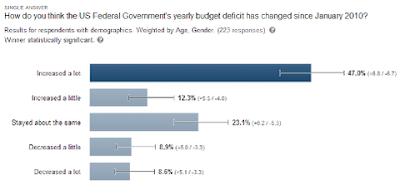Shamelessly ripping the graphics;
 |
| Public perception of federal U.S. budget deficit development |
 |
| Actual development of federal U.S. budget |
A whopping 91.4 % +/- a few are wrong about such a basic, central and much-debated figure.
This is eerily reminiscent of similar polls regarding Saddam Hussein's (non-) involvement in 9/11, about whether WMD have been found in Iraq et cetera.
I'm not trying to paint U.S.Americans as exceptionally poorly informed (maybe all nations are this poorly informed), but such stark examples are simply irresistible as examples to shine some light on a broader problem:
Published opinion forms public opinion which in turn correlates with voting behaviour and thus allocation and legitimation of power. The whole thing gets rotten if the root is rotten.
Also: Maybe the dangerousness, volatility and aggressiveness of countries is more dependent on the nature of its political "news" and opinion media than on notional government ideology, political system, history et cetera?
Sven O.
P.S.: This was originally a much, much longer draft, but I spared you the long rant about shitty media in Germany.
.

A few comments: firstly and most trivially the caption to the second picture is a lie as it contains three projected datapoints (2013 not being over yet) but labels the entire series "actual development".
ReplyDeleteSecondly I note you are of the opinion that only one of the answers could be correct, where I would say that with this wording of the alternatives (as well as asking the general public) only getting the sign of the change completely wrong counts as an incorrect guess.
Updating the partial result of just 223 people, when I cheked it just now it had ~1800 weigthed respondents and the bottom two answers had mustered 20% in total, with another 24 % in the middle bin. Giving 44% Correct and 46 % incorrect.
Of course there are still more methodolgy questions, such as how google does its magic weighting of answers for instance. But your point still stands, 46 % being wrong about the sign change of such an important macroeconomic indicator is of course depressing, one would hope it would be no bigger than the ammount that believe evolution doesn't exist (46% according to a gallup poll 2012, although this is second hand).
Nitpicking aside, more than 50% getting it wrong is disastrous.
DeleteAnd yes, a reduction by half can only be described correctly with "decreased a lot", no with "decreased a little". The latter is wrong.
I disagree about the caption being a lie (naturally), but I think the line should become discontinuous in 2013.
The caption still clearly implies all of the points are data, while it is obvious that this is impossible. I strongly urge you to just steal Krugman caption that does not have this false implication.
DeleteThe official data* (2010-2012) say that the deficit as percentage of the GDP has decreased by 1.9 percentage points. That's not a lot of percentage points, but I grant you that it is a big percentage of those percentage points.
*http://www.cbo.gov/publication/44507 Mind you the CBO recently updated their numbers on account of new estimates of historical GDP (it is now about 3.5 percent bigger).
Are you somehow fooling yourself?
DeleteOpen your eyes, that budget deficit has decreased a lot. 1.9 per cent points are 1.9% of 16 trillion or so. It's "a lot", period.
The current poll figures aren't substantially different. Personally would rate anything above 50% wrong as a horrible result. The current result doesn't merely look like a random distribution; it looks like a random distribution that got a bias towards "wrong" added.
Anyway, 40% wrong seems to be typical for Americans, given the uncertainty of polling.
DeleteExamples include global warming (38 % thinks there is no scientific concensus 2013, gallup), evolution (31 % favour intelligent design 2009, Pew research), abillity to find Iraq on a map (37 % fail 2006, Roper for National Geographic) and belief that India is a muslim country (48 % 2006, Roper for National Geographic).
1.9% of 16 trillion is nothing. I hear government people all the time talk about it's only a few billion for this or that so 1.9% is hardly anything.
ReplyDelete